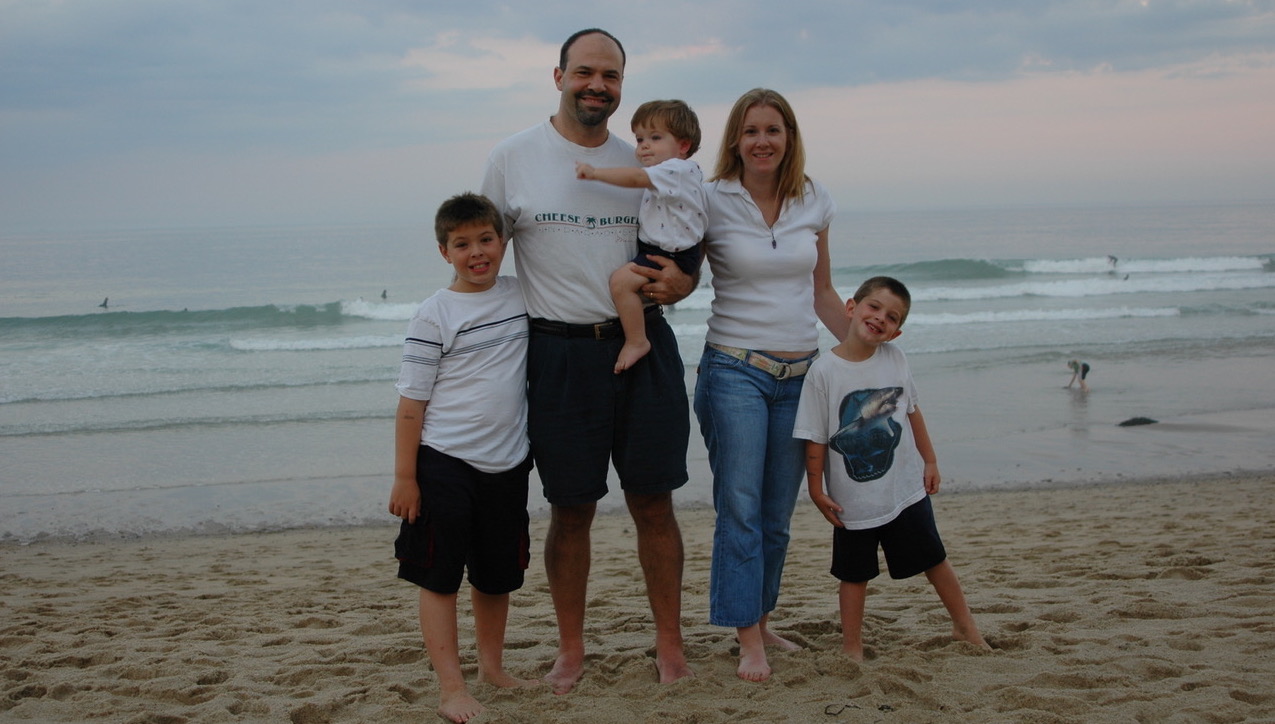
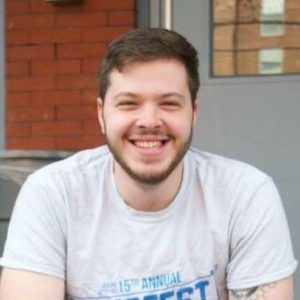 One of Zachary Dubin’s charms is his ease in talking to others. He knows that is one of his many strengths because of the experiences of sharing his family’s story as well as his own. Zach is a previvor, being diagnosed with the Lynch Syndrome gene that his grandfather and his father have. Lynch Syndrome is a hereditary gene that increases a person’s risks for cancers, particularly colon cancer. His grandfather is colon cancer survivor, and his father is a three-time cancer survivor. His father was diagnosed with colon cancer at 29-years-old.
One of Zachary Dubin’s charms is his ease in talking to others. He knows that is one of his many strengths because of the experiences of sharing his family’s story as well as his own. Zach is a previvor, being diagnosed with the Lynch Syndrome gene that his grandfather and his father have. Lynch Syndrome is a hereditary gene that increases a person’s risks for cancers, particularly colon cancer. His grandfather is colon cancer survivor, and his father is a three-time cancer survivor. His father was diagnosed with colon cancer at 29-years-old.
When Zach turned 18, he went and got tested for the gene, knowing from a young age that it was something that he was supposed to do. “It was pretty much [something] that I had to do. There was really no other option. Just look at the numbers and it wasn’t pretty. So it was something that when I was 16 or 17, my 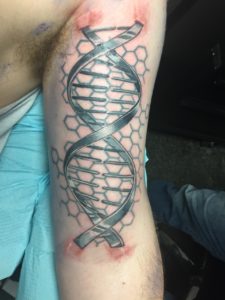 parents [said], ‘Once you get older, when you turn 18, you’re going to have to choose whether you want to get tested or not.’ I assumed I was already going to be tested, I didn’t really know I had a choice.”
parents [said], ‘Once you get older, when you turn 18, you’re going to have to choose whether you want to get tested or not.’ I assumed I was already going to be tested, I didn’t really know I had a choice.”
Zach became aware of the gene when his father was diagnosed with cancer the second time when Zach was in first grade. “He had cancer again, and I didn’t really comprehend what that meant because I was 6, or 7, or 8, so I didn’t really have a grasp on what that meant. Obviously he was fine, but then afterwards, that’s when I grew up and matured and started asking questions because that was when this sort of started to become more of a major part of our lives.”
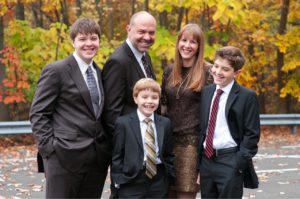 Zach said that it wasn’t until sixth or seventh grade when he really understood his family’s situation and what the future would hold. He was able to grasp on and knew that it was a part of his family, where everyone became comfortable talking about cancer and the Lynch Syndrome gene.
Zach said that it wasn’t until sixth or seventh grade when he really understood his family’s situation and what the future would hold. He was able to grasp on and knew that it was a part of his family, where everyone became comfortable talking about cancer and the Lynch Syndrome gene.
“Cancer, what we liked to put it, was a dinner conversation. And so it became a very casual thing for us. No one was shy about it, as you can see; we like to put ourselves out there. It’s made us close as a family, and it’s definitely made us very tough. It’s not something easy to deal with, but we’ve become stronger because of it.”
Zach has shared his story many times, that it has led him to a career in which he’ll continue to help others tell their own story. Zach started his education with a focus on video game design, but found that it did not make him happy. With a switch over to a business-related field, he garnered interest and was on the steady path towards graduation. It wasn’t until he attended an event at the National Society of Genetic Counselors (NSGC) where he told his story, that he was approached to continue sharing his story.
“[I]t was eye-opening. Everyone was telling me, ‘Your story is so amazing.’ I was looking, and there was a job board, and the amount of postings for all the jobs that there was; it was just insane. There were so many. And there’s not enough genetic counselors to fill it. When I got back from the convention, I [thought], I don’t know why I’m not doing this. It’s right up my alley.”
Zach is graduating this spring from Drexel University in Philadelphia, PA, and will be attending graduate school within a year. His graduate program will take two to three years to complete. “I’d like to think that I’d like to work in a hospital or something, and do genetic counseling there. But I honestly have no idea where that would take me. When you do genetic counseling, there’s usually more of the researching side, studying the diseases and everything like that, and then there’s the hands-on, patient’s time side, and that’s really what I want to do.”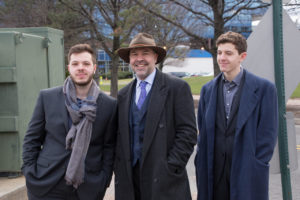
Between being a regular college student as well as helping out with his parents’ AliveAndKickn organization when he can, Zach lives a pretty ordinary life and does not let Lynch Syndrome define his life. When he was tested in high school in 2014, he struggled for a short period, dealing with the news that no other high school student typically deals with. “I was 18; I was trying to figure out where I was going to college, and I was trying to figure out who I was taking to senior prom. And those were the two biggest concerns that you should have as an 18-year-old in high school.”
 After his diagnosis, Zach credited his father and his family’s history with giving him the right tools he needed for the future. “It sucked, I was pretty upset about it for the first few weeks, and then I just kind of got over it. It didn’t really make any change in my lifestyle at all. I just knew something that I didn’t know before. I had to see a bunch of doctors, which sucks, but it’s nothing that I can’t handle.”
After his diagnosis, Zach credited his father and his family’s history with giving him the right tools he needed for the future. “It sucked, I was pretty upset about it for the first few weeks, and then I just kind of got over it. It didn’t really make any change in my lifestyle at all. I just knew something that I didn’t know before. I had to see a bunch of doctors, which sucks, but it’s nothing that I can’t handle.”
Zach’s everyday moments show that Lynch Syndrome doesn’t slow him down. His only big change is visits to the doctor, which he says does not make a big difference in his life. While in college, Zach fits his doctors’ visits between his quarterly breaks. “[W]henever I go home for the break, I usually have one or two doctors appointments. I’ve got my primary oncologist, Julia Smith. I’ll go see her at the end the summer and she’ll tell me to get these things done, usually blood tests, an MRI or a CAT scan, and an ultrasound. Basically, I have to get one done each break throughout the year. Every year around June, I have to get a colonoscopy. That’s really the only big change that I’ve had; just regular doctor visits.”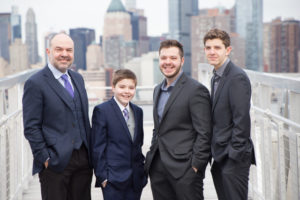
With all these events and experiences in his life, Zach has become an advocate for Lynch Syndrome and colon cancer. Zach is always making sure to bring it into the conversation and getting people aware. “It’s not too sensitive. It’s one of the most important questions that you’ll ask in your life: “Do I have something?” Because the worst thing that you can do is willingly live in the dark about something that is potentially could be life threatening.” Zach credits his conversational strengths as one way of getting word out about Lynch Syndrome and colon cancer, saying that it’s a topic that forms naturally.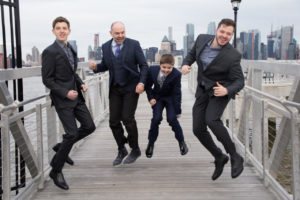
Although Zach is comfortable speaking out about his family’s stories and about Lynch Syndrome, Zach doesn’t feel much of a need to tell his previvor story. “I almost feel like I don’t have that much of a story some times, because as of right now, it’s all preventative and it’s not as dramatic as my dad’s. My dad, he’s done everything, he’s done all that makes it seem like a grand thing. You really feel like it’s more of me just seeing how I’ve dealt with it while being in school this whole time. It doesn’t seem like a very big deal to me, in comparison.”
Whether or not he includes his story or not, he knows that his is an ongoing journey. Zach references the famous Rocky quote, “You, me, or nobody is gonna hit as hard as life. But it ain’t how hard you hit; it’s about how hard you can get hit, and keep moving forward,” in regards to how he views everyday life, not just life with Lynch syndrome. “Life goes on, no one stops. You can’t really let it control you because that’s just how you lose. I like to look at it, I’m the master of my own destiny, so I try to do everything I can to stay healthy and keep moving forward, and I think that everyone else should have a similar mindset.”
ALIVEANDKICKN LEARN MORE ABOUT GENES AND COLON CANCER MAYO CLINIC - LEARN ABOUT LYNCH SYNDROME RETURN TO FACES OF BLUE


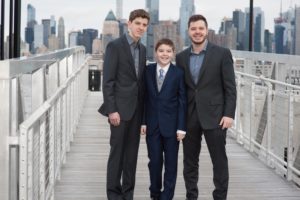
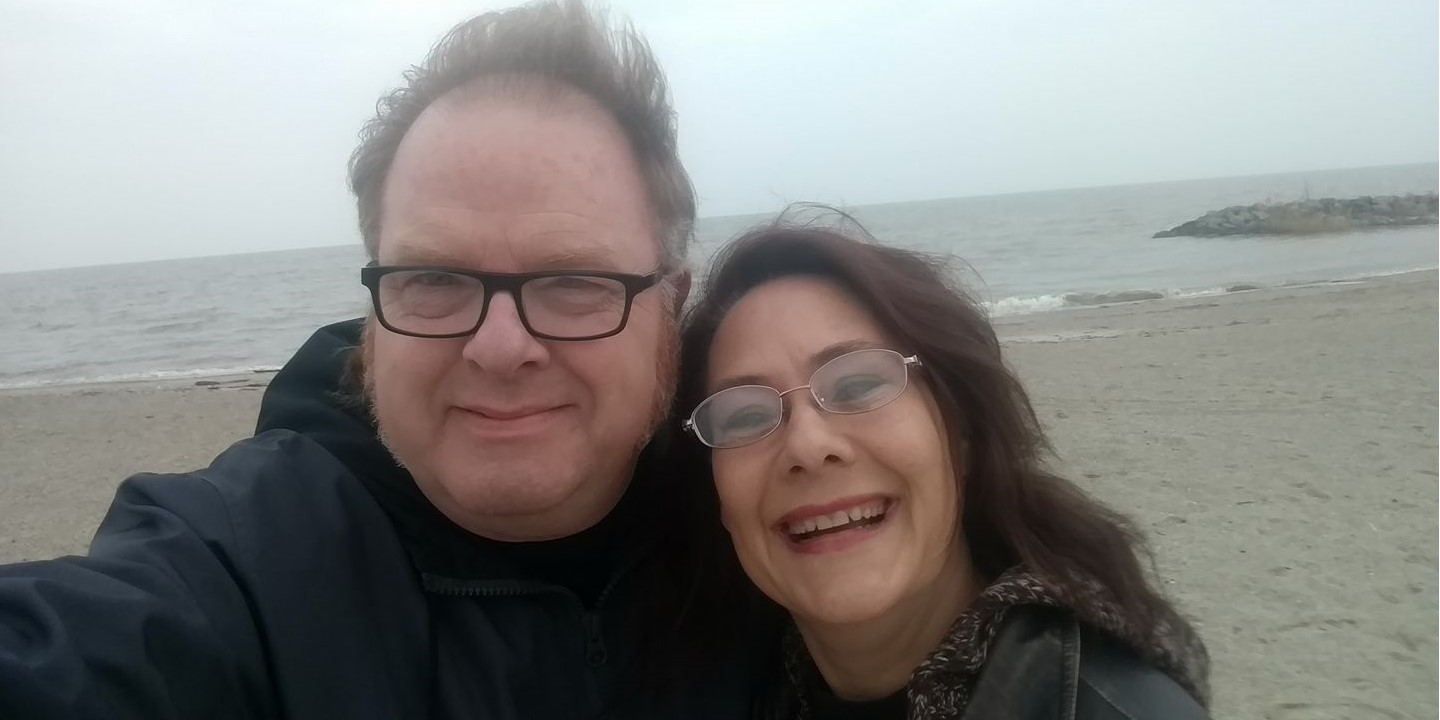
[…] post Faces of Blue: Zachary Dubin appeared first on Colon Cancer […]